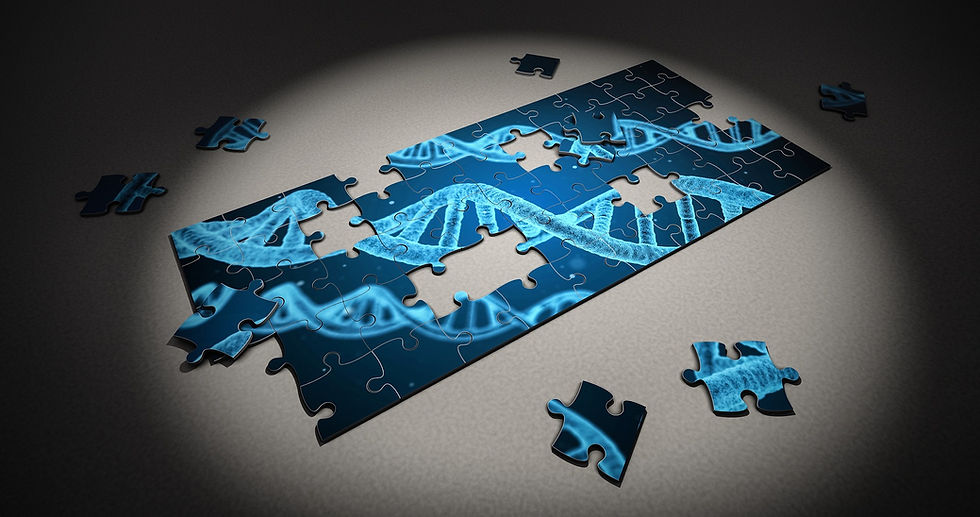Opinion: CRISPR is the Future of Biology
- Anand Mehta
- Dec 7, 2020
- 4 min read
Updated: Mar 22, 2021
Audience: Middle and High School Students
In the mid-1800s, an explorer named Charles Darwin sailed on a ship called the H.M.S Beagle to embark on a five-year journey around the world. Darwin was invited to sail around the entire world on an exploration voyage to study the natural world. He made several prominent discoveries that led to the foundations of modern biology—a science dedicated to the study, classification, origin, and evolution of organisms and various species. Darwin made his biggest discovery on the Galapagos Islands, off the coast of South America. There, he studied birds with different variations in their beaks. He reasoned that the environment of the bird forced them to develop these changes. Darwin then constructed his theory of evolution, in which he hypothesized that organisms compete in environments and went through both short-term and long-term changes depending on the environment around them.
Biology and the study of genetics allows us to explore how plants grow and animals evolve. Photo by Ejaugsburg from Pixabay.
Following Darwin’s theory of evolution, there was an explosion in new biological discoveries around the world. Scientists began to look further into the evolution of different species and how humans themselves evolved from other animals. Darwin’s theory laid the foundation for the modern study of organisms—ranging from the largest animals to the smallest viruses. This field of study, formally known as biology, has applications in multiple fields, and has only continued to advance. DNA, known as Deoxyribonucleic acid, was discovered as the main building block of life in the 1950s, and scientists realized that genetics and DNA play a large role in what traits individual organisms have. Rearranging a single strand of DNA can change an organism entirely, and this discovery proved all the more important in figuring out how we could alter our own bodies. There has been prevalent discussion about how we as humanity should use this new information to do something that was once unimaginable: cure diseases, efficiently develop vaccines, and even alter the strength and intelligence of individuals.
A new technology, known as “CRISPR” (Clustered Regularly Interspaced Short Palindromic Repeats) technology, has become mainstream in the scientific community as it points to a future where we can change the composition of our own bodies.
CRISPR technology allows us to edit our own genes and DNA, which can create significant changes in a variety of traits.
For example, CRISPR technology was used in 2017 to successfully treat a genetic heart defect in two babies. However, not all cases of CRISPER use are successful. It is important to note that costs for developing the equipment still remain high, as there are ethical considerations about whether it is right to allow people to have control over our genetics and DNA. Will people use this technology for the wrong reasons? How will it impact the future of humanity and other species around the planet?
Like a puzzle, CRISPR allows us to edit, alter, insert, and remove parts of our DNA to create physical changes. Photo by Qimono from Pixabay.
CRISPR technology is advancing rapidly, and scientists are using it to pursue a new era of medicine. Whereas Darwin would observe and experiment on genes and traits that we had no control over, CRISPR presents opportunities to change the future of the human species and provides many powerful solutions to world issues (such as genetic diseases and viruses) that have plagued humanity for decades. For instance, CRISPR was used in May 2020 in a living patient’s body in order to eliminate their genetic blindness. Dr. Jason Comander, an eye surgeon who observed the previously mentioned procedure, claimed that CRISPR represented a “new era of medicine.” The technology had the potential to change the medical community and the world as a whole.
In a time where national media attention is closely following the medical field and the development of a COVID-19 vaccine, CRISPR technology has become more useful in its potential to help discover novel and unique cures that combat the spread of this deadly virus.
Some believe that the pandemic has proved that humanity needs this new technology now more than ever, and that the possibilities regarding this technology to help prevent or create cures for future diseases and illnesses are endless. However, there are ethical concerns about whether we should be giving individual humans the right to control the very makeup of our bodies. This could be utilized in ways that we can’t even think about, such as being able to purchase genetically-designed babies, or amplifying intelligence and strength. Having such power over natural processes could lead to much larger changes in the future.
Scientists are still in discussion about how CRISPR technology should be used and to what extent we should alter human genetics.
Entering the field of medicine to help advance the applications of CRISPR technology is a very realistic goal that many in the younger generations are seeking to accomplish. Our generation has more information about DNA and genealogy than any other generation in the past, and with enough people going into this field, we have the potential to make an even greater impact on the world.
Note: The opinions presented here are of Anand Mehta, the writer, and not of STEMpower as a whole.
Bibliography
Medical, Columbia. “The Future of Gene Editing.” Columbia University Irving Medical Center, 5 Aug. 2020, www.cuimc.columbia.edu/news/future-gene-editing.
Vidyasagar, Aparna. “What Is CRISPR?” LiveScience, Purch, 21 Apr. 2018, www.livescience.com/58790-crispr-explained.html.
“What Are the Ethical Concerns of Genome Editing?” Genome.gov, National Human Genome Research Institute, Aug. 2017, www.genome.gov/about-genomics/policy-issues/Genome-Editing/ethical-concerns.
Like and share this article! Also, follow our Instagram @stempower.us and subscribe to our YouTube channel here!







Comments